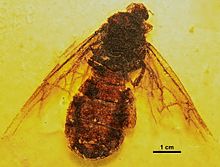User:Burklemore1/Sandbox 2
Appearance
| Burklemore1/Sandbox 2 Temporal range:
| |
|---|---|

| |
| Dorsal view of Titanomyrma gigantea holotype, specimen SMFMEI00998 | |
| Scientific classification | |
| Kingdom: | |
| Phylum: | |
| Class: | |
| Order: | |
| Family: | |
| Subfamily: | |
| Genus: | Titanomyrma Archibald et al., 2011
|
| Type species | |
| Titanomyrma gigantea | |
| Species | |
| |
Etymology
[edit]The name of the genus is a derivative of the Greek Τιτάν (Titan), meaning 'one of prodigious size, strength, or achievement',[1] and alluding to the Titans of Greek mythology; and the Greek word μύρμηξ (myrmex) meaning 'ant',[2] gender feminine. The specific epithet of the new species is formed from the surname of the collector of the holotype, Louis Lube.[3][4]
References
[edit]- ^ Titan. (n.d.) The American Heritage Dictionary of the English Language, Fourth Edition. (2003). Retrieved May 9, 2011 from The Free Dictionary.
- ^ "Myrmex". Greek Myth Index. www.mythindex.com. 2007. Retrieved 10 May 2011.
- ^ S. Bruce Archibald, Kirk R. Johnson, Rolf W. Mathewes & David R. Greenwood (2011). "Intercontinental dispersal of giant thermophilic ants across the Arctic during early Eocene hyperthermals" (PDF). Proceedings of the Royal Society B. 278 (1725): 3679–3686. doi:10.1098/rspb.2011.0729. PMC 3203508. PMID 21543354.
{{cite journal}}: CS1 maint: multiple names: authors list (link) - ^ Richard Black (3 May 2011). "Giant ants spread in warm climes". BBC News. Retrieved 10 May 2011.
